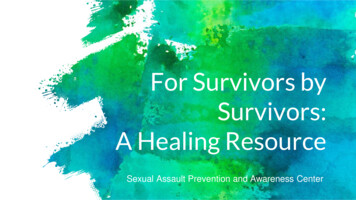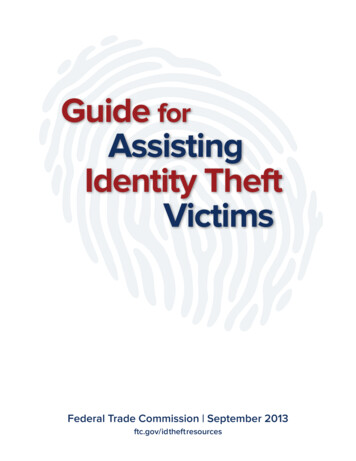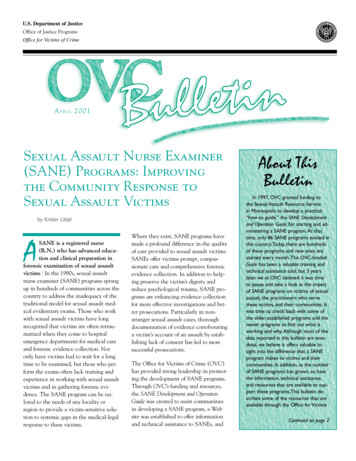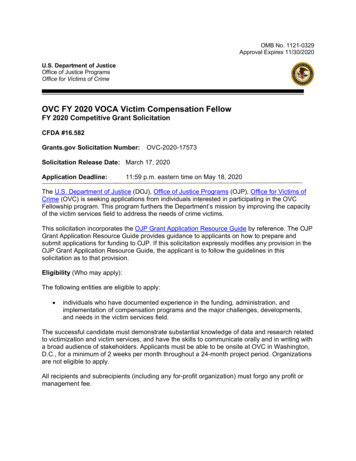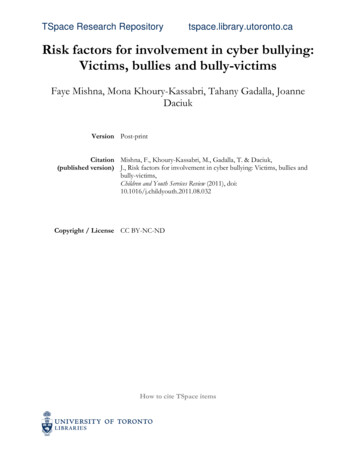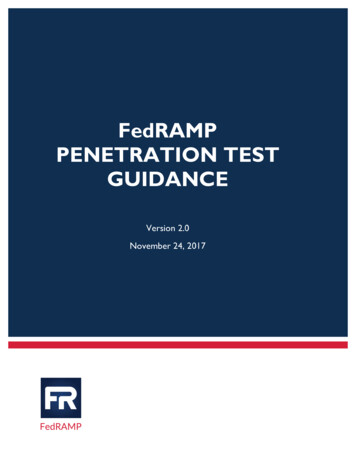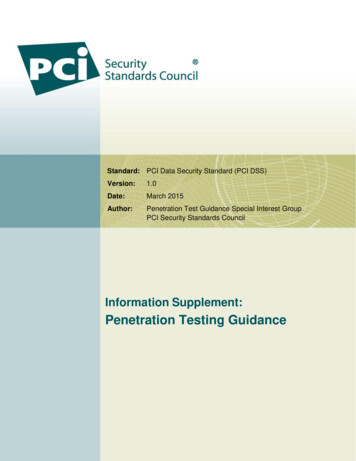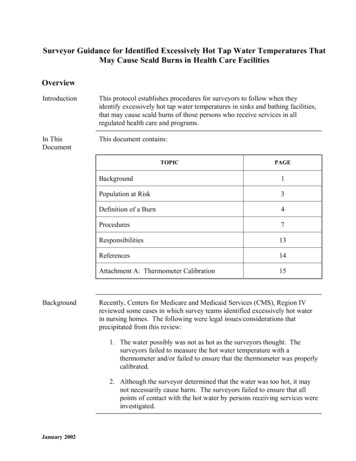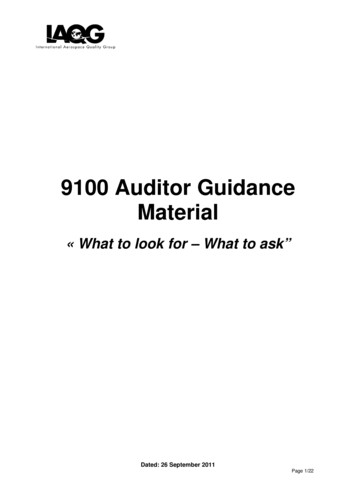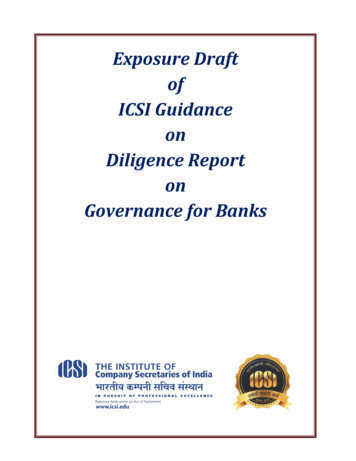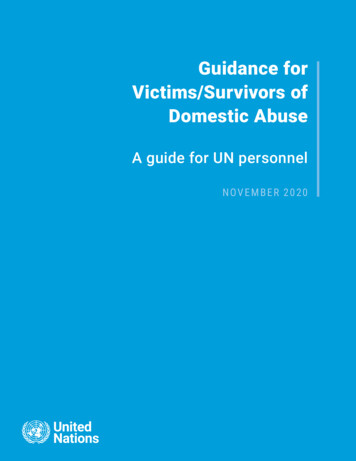
Transcription
Guidance forVictims/Survivors ofDomestic AbuseA guide for UN personnelNOVEMBER 2020
DISCLAIMER: This document is intended as an informational resource only and does not take the place oflegal advice. For all legal matters, please consult a local attorney, as laws vary from country to country andjurisdictions within countries.
1GUIDANCE FOR VICTIMS/SURVIVORS OF DOMESTIC ABUSE1. INTRODUCTIONYou are not alone; the Organisation is committed to support you while you are suffering from domesticabuse. Domestic abuse is never the victim’s fault. Many other colleagues within the UN family have alsosuffered domestic abuse, including physical, sexual, emotional, economic or psychological abuse.This guidance was developed with you in mind. Recognizing that every personal situation is different, thisdocument should only be regarded as a guidance, along with other external resources.2. DIGITAL SAFETYInternet safetyAs you surf the internet on your computer, the links to websites you visit are stored on your hard drive ascookies; hence, they can always be retrieved or monitored. In the event you have concerns regarding yourshared devices, you may wish to use safe computers that can be found in local libraries, shelters or work.EmailYour abusive partner could have access to your email account. For safety planning and sensitive communications, open a new email account using a computer outside your household. Refrain from logging in tothat account from home. It is a good idea to keep your monitored email account active with non-criticalemails in order to maintain appearances.Cell phoneCell phones can be a beacon, tracking your exact location in real time. Be mindful that calls and text history may be retrievable. Additionally, a location tracking device (GPS) can be placed on your car or in yourpurse. You may wish to consider purchasing a prepaid phone (if available) that you keep in a safe place.Social mediaDo not post personal or confidential information. Once uploaded, your post will no longer be under yourcontrol. Be protective of your personal information. Your phone number, email addresses and other data suchas your date of birth, the schools you attended, your past and present employers and photos with landmarksmay make it easier for someone to track you down. Don’t share your travel or vacation plans and don’t check-into locations on social media. You may wish to consider blocking your partner/ex-partner on your social mediaplatforms to make it more difficult for them to track you online. You may wish to get advice about any laws thatmay protect you if personal photos and/or videos are shared on social media without your consent.Consider taking a refresher of the UN Information Security Awareness courses. For more information, seeTechSafety.org’s Toolkit for Survivors which includes how to create a technology safety plan, assessing anddocumenting abuse, overview of spyware/stalkerware, tips on cell phone safety & privacy and much more.GUIDANCE FOR VICTIMS/SURVIVORS OF DOMESTIC ABUSE NOVEMBER 2020
23. SAFETY PLANNINGYou may wish to consider the following as part of your safety planning efforts: Familiarize yourself with the cycle of abuse. For more information, see this National DomesticViolence Hotline article. Familiarize yourself with the dynamics that tend to repeat overtime. Trust your instincts and judgment. You have the right to protect yourself. Practice getting out of your home safely. Practice with your children. Plan for what you would do if your partner found out about your plan. When you feel that a situation is escalating, avoid rooms with potential weapons, such as the kitchen,and move to rooms with easy exits. Be aware of any weapons kept in the household. If possible, keep guns and knives locked away and asinaccessible as possible. Decide code word or signal that means “call the police” or “call a trusted contact” and share it withyour children, family, friends, and trustworthy neighbors. Have an overnight bag ready if you need to leave quickly, and store it in a safe place (e.g. at work,friend’s house). Plan how you will leave and where you will go if you were to leave your home. Know the phone numberto your local shelter, just in case you need to leave your house for an extended number of days. Keep a set of car keys with you at all times. Make a habit of keeping the car fueled and backing it intothe driveway. Create several plausible reasons for leaving the house at different times of the day or night with andwithout your children.4. WHILE LIVING TOGETHERYour safety comes firstYou may wish to consider: If you are in imminent danger, immediately call the police. During an argument, stay in an area with an exit and try not to let your abuser get between you and theexit. If violence is unavoidable, take defensive measures by making yourself a small target.GUIDANCE FOR VICTIMS/SURVIVORS OF DOMESTIC ABUSE NOVEMBER 2020
3 Avoid wearing apparel or jewelry that could be used to harm you. Be mindful that violence often escalates when the victim tries to leave the abuser. Try to planaccordingly. You may wish to consider confidential counseling at this stage of your relationship. To learn more, seesection 12. Psychosocial Counselling.Matters to research and understand If you live outside your home country and are planning to leave your partner/ex-partner, get a divorceor separation, and/or establish child custody, start by consulting an attorney who understands thecomplexities of international divorce or separation and child custody proceedings as well as theimmigration consequences of divorce or separation. If you can’t afford an attorney, contact a free legal service organisation or visit your local family court.They may be able to determine whether you are eligible for a free legal consultation or a pro-bonoattorney. In the event that you are not eligible for a pro-bono attorney, you can still file on your ownfor a divorce or separation ( pro se), protect your child custody rights, and obtain financial support foryourself and your children. A legal service organization or a court may provide you with all the necessary documentation and guide you through the process. Please refer to sections below on divorce andinternational child custody. Find a safe accommodation if you decide to leave. Your personal safety and the safety of your lovedones should always remain your priority, even if it means that you have to leave your home. If possible,prepare your departure in advance. If possible, don’t leave without documentation and evidence of the abuse. If you feel threatened, callthe police. If you are a UNFCU client and experiencing financial hardship, please contact their dedicated domesticabuse focal point at support@unfcu.com.5. PREPARING TO END THE RELATIONSHIPDocument the evidenceIt is important to keep track of the abuse. This will support any legal action you may take to protectyourself and/or your loved ones. Therefore: Keep evidence of physical abuse, such as pictures of injuries. Document all incidents with dates, events, threats made against you and/or your loved ones, hospitalvisits, etc. Keep your documentation in a safe place. Contact your bank, you may be eligible for a freesafe deposit box.GUIDANCE FOR VICTIMS/SURVIVORS OF DOMESTIC ABUSE NOVEMBER 2020
4 Tell someone what is happening to you and give them your consent to speak to police on your behalf, ifneeded. If you are in distress during working hours, you may wish to consult a UN doctor, a nurse or a UN StaffCounsellor. If you are injured, go to a doctor or an emergency room and report what happened to you in full details.Ask that they document your visit. Doctors and nurses may be able to reach out to social servicesproviders and other authorities to provide support to you. They may also be required to report theincident to the police or other authorities. If living abroad, make an appointment with your Consulate and write a report of your situation for yourpersonal file.Prepare to end the relationship You may wish to contact a local domestic violence support organisation or local shelter and find outabout governmental resources and other options available to you. You may wish to consider confidential counseling at this stage of your relationship. To learn more, seesection 12. Psychosocial Counselling. You may wish to set money aside or ask friends or family members to hold money on your behalf. If you have any questions or concerns on your bank accounts, consult with a financial advisor at yourbanking institutions. If you are a UNFCU client and experiencing financial hardship, please contact their dedicated domesticabuse focal point at support@unfcu.com. Make a plan for how and where you will escape quickly. The following list may help you organize yourdeparture:Identification (original and scanned versions) Passport, driver’s license Birth certificate and children’s birth certificates Social security cards Financial information Money and/or credit cards (in your name) Checking and/or savings account booksGUIDANCE FOR VICTIMS/SURVIVORS OF DOMESTIC ABUSE NOVEMBER 2020
5Emergency Numbers Your local police and/or sheriff’s department Your local domestic violence programme or shelter Friends, family members and relatives Your local doctor’s office and hospital Your local criminal prosecutor’s office, e.g. a county and/or district attorney’s officeLegal Papers (original and scanned versions) Protection/Restraining Order Lease/rental agreement or the deed to your home Car registration and insurance papers Health and life insurance papers Medical records for you and your children School records Immigration documents, including passport, resident permits, visas, work permits, etc. Divorce and custody papers Marriage licenseOther Medications Extra set of house and car keys Valuable jewelry Prepaid cell phone (besides your regular cell phone) Contacts/address book Pictures and sentimental items Several changes of clothes for you and your children Emergency moneyGUIDANCE FOR VICTIMS/SURVIVORS OF DOMESTIC ABUSE NOVEMBER 2020
6At work Consider asking to change your working hours (staggered working hours under Flexible WorkingArrangements Policy) or requesting permission to use SLWFP to take care of proceedings in relationto leaving your abuser, such as restraining orders, police reports, meetings with attorneys, psychosocial counselling, school and child counsellor, etc. Do not miss work without speaking to your supervisor first. If you are not comfortable speaking withyour supervisor, you can contact your Staff Counsellor or your Executive Officer for further guidance. Revise your emergency contact detail list in your internal HR and IT systems. Update your list of beneficiaries to ensure that only those you indicate receive your death benefits, byfilling out form “Designation, Change or Revocation of Beneficiary ” P.2 (7-09)-E, and submit the originaldocument to HR. This can be done at any time and does not require any additional documentation. Contact UNDSS/your Security Unit and ask them to restrict your abuser from accessing the UNpremises. Provide a photograph and name of your abuser. When threatened, you may request an escort from UNDSS/Security Unit to leave your workplace.If UNDSS/Security Unit cannot provide assistance, contact your local police station for furtherassistance. If your abuser is also a UN personnel, you may wish to: Contact your supervisor, Gender Focal Point or Executive Officer for further guidance and support; File a misconduct complaint by reporting to your direct supervisor, OIOS/investigative service orby contacting your HR focal point.6. AFTER YOU HAVE ENDED THE RELATIONSHIPYour continued safetyThe most dangerous time is when you are planning to leave or have recently left your partner. Stayingsafe is crucial during this time. You may also wish to consider consulting a counselor at this stage to helpyou heal, build your resilience and regain your self-esteem and self-confidence. To learn more, see section12. Psychosocial Counselling.At homeYou may wish to consider: Change your locks. Call your phone provider to change your numbers and make them unlisted.GUIDANCE FOR VICTIMS/SURVIVORS OF DOMESTIC ABUSE NOVEMBER 2020
7 When possible, change your work hours and the route you take to and from work, or seek authorizationto exceptionally work from home 5 days or outside the duty station. Change the route taken to transport children to school or consider changing your children’s schools. Alert your children’s daycare(s) and school(s) of the situation. Provide them with any restraining orderin effect. Alert them of any revised schedule for pickups if your ex-partner has visitation rights. Updatethe list of adults authorized to pick up your children. Ask the school to notify you if your ex-partnerattempts to pick up your child/ren outside normal pick-up hours or days. Talk to people who take care of your children or drive them/pick them up from school and activities.Explain your situation and provide them with a copy of the restraining order. If you have a restraining order in effect, keep a certified copy with you at all times, and inform trustedfriends and neighbors that you have a restraining order in effect. Ask that they call the police if theyfeel you may be in danger. Call law enforcement to enforce the order when the abuser violates the order. Consider renting a post office box or using a friend’s address for your mail (be aware that addressesare on restraining orders and police reports, and be mindful of whom you give your new address andphone numbers). If you have any questions or concerns on your bank accounts, consult with a financial advisor at yourbanking institutions. If you are a UNFCU client and experiencing financial hardship, please contacttheir dedicated domestic abuse focal point at support@unfcu.com. Reschedule appointments that the ex-partner is aware of. Use different stores and frequent different social spots. Install a security system and a motion sensitive lighting system on your property, if possible.At work If you are a spouse of a UN staff member or if you are both UN staff members, contact HR to learnwhether your partner can remove you from different entitlements. Some entitlements can be removedat any time, others are dependent on divorce papers or annual enrollment/change campaigns (such asinsurance). Alert UNDSS/your security unit if you have a restraining order. Give Security the name and a picture ofyour ex-partner so that the person can be barred from entering your workplace. This information willbe shared with the reception desk. Immediately after your physical separation, contact your HR Focal Point and let them know that yourex-spouse/domestic partner no longer lives with you. If you haven’t already done so, update your list of beneficiaries to ensure that only those you indicatereceive your death benefits, by filling out form “1.P.2-E (Designation, Change or Revocation ofBeneficiary)” and submit it to HR.GUIDANCE FOR VICTIMS/SURVIVORS OF DOMESTIC ABUSE NOVEMBER 2020
8 Change your passwords on your UN accounts including email. If you fear your ex-partner may try tobreach your account, contact your IT desk. If you are occasionally working remotely, make sure your passwords are not saved on your homecomputer; do not share your home laptop profile password with anyone. Be careful allowing cookiesfor sites other than UN websites on your home computer as they may automatically save your datawithout your acknowledgement. When you close your browser, consider deleting your browser history.You may also use browser in private or incognito mode to ensure your actions are not being tracked. Inform your supervisor and your Executive Officer of any personal change (address, phone number,etc.) and update your contact details on internal HR and IT systems. If your bank accounts are shared, open a new bank account and complete the form F.48 Authorizationfor Direct Deposit of Salary to ensure your salary is going into an account your ex-partner cannotaccess. Please refer to the UN Pension Fund (UNJSPF) webpage on divorce for further information and todownload the Divorce Booklet. You may wish to review and update your PENS.A/2 – Designation of Beneficiary for a ResidualSettlement to remove your ex-partner’s name. If you have further questions, please refer to the UNJSPF ‘Contact Us’ webpage:https://www.unjspf.org/contact-us/ If you have enrolled in the non-mandatory life insurance policy, you should update your beneficiaries byfilling out the Designation of Beneficiary form (available in the ST/IC/2002/63, page 25) and submitting it to your local HR Focal Point. If your ex-partner is: A dependent, you can remove them as a dependent at any time, no documentation is needed, yousimply need to inform HR of the change in dependency claim. Be mindful that you can only terminate the health and dental insurance coverage of your dependent during the Annual Insurance Enrolment Campaign or in case of a change in your personalstatus (divorce, death). The application for termination needs to be made within 31 days of suchan occurrence.7. CIVIL PROTECTION/RESTRAINING ORDERS You may want to consider a civil protection/restraining order to protect you and your children fromdomestic abuse. This type of legal order tells your abuser that they cannot abuse or harass you, andthere are legal consequences for violating the protective order. It can also tell them not to approachyou, nor contact you and/or your loved ones. In many jurisdictions, an initial protection order may betemporary, and can include temporary custody of the children and a visitation arrangement, temporaryGUIDANCE FOR VICTIMS/SURVIVORS OF DOMESTIC ABUSE NOVEMBER 2020
9child support, use of the home and/or a vehicle, removal of firearms and other legal orders to attemptto end the violence. If your abuser is allowed to re-enter the house to pick-up their personal belongings, make sure they are accompanied by a police officer. Following a temporary restraining order,there will be a hearing in the relevant court, e.g. family court, to determine whether the protection/restraining order should be renewed or become permanent, and if there will be further hearings ondivorce, separation, child custody, child support, etc. A restraining order does not necessarily involvethe criminal justice system unless the perpetrator violates the order.8. SEPARATION, DIVORCE AND CHILD CUSTODY Separation and divorce cases involving UN partners can be complicated and frightening particularlywhen immigration status, such as G-4 visa status, is a factor. It is vital that you select an attorney whois experienced in working with international families and is familiar with the applicable immigrationregulations. Hiring the most competent legal help available is important, even if it involves borrowingmoney to do so. The need to understand the legal terms and processes can make it particularly intimidating. Attorney fees are often calculated in minutes spent working on your case; some attorneys mayagree to a flat fee. Agreements with attorneys on their fees should be made in writing and in advance.The more you can educate yourself before you meet your prospective attorney, the less money you willultimately spend. If you hire an attorney, please make sure to vet their experience with international divorce/childcustody. Questions to consider when interviewing potential attorneys:Expertise How many years have you been practicing law? What is your experience with domestic violence cases? What experience have you had working on international divorce and child custody cases? Which countries do you have experience with? What experience have you had working with clients on their immigration status? What is your experience litigating contested custody cases? Who in the office will actually work on my case? How long can I expect my case to take? How will I know
If you are a UNFCU client and experiencing financial hardship, please contact their dedicated domestic abuse focal point at support@unfcu.c
